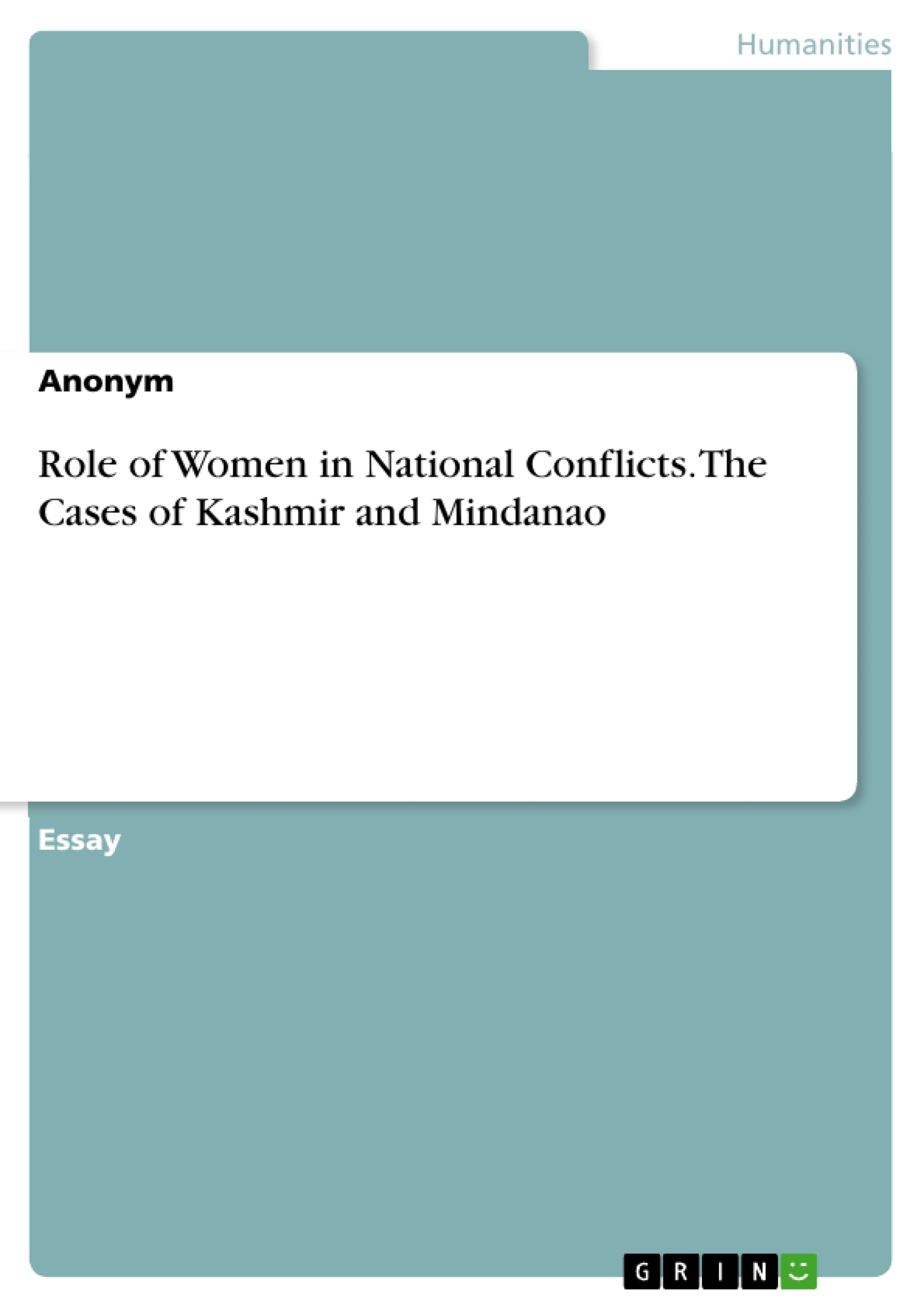This paper connects the topic of feminist identity with national conflicts and compares two regions in Asia with current nationalistic tendencies. The paper focuses on the regions of Kashmir in Northern India and Mindanao in the Southern Philippines. This seemed appropriate, as both regions share a range of commonalities concerning their specific (post-)colonial development. The paper will investigate common – but also diverging – aspects by focusing on the Hindu / Christian 'self' and the Muslim 'other', the forced annexation by the state and the major political changes from the 2000s.
As a second step, the author decided to focus on the role of Muslim women in the conflict situations in Kashmir and Mindanao. While exploring female agency in religio-political movements in India during the course, this essay wanted to find out about its counterpart in the Philippines. In this regard, the guiding questions were: What different forms of female agency can be found in Kashmir and Mindanao?
How can Muslim women articulate their activism within a male dominated society? What are the prerequisites in order to enable emancipatory female activism in a conflict area? And what influence do Modi’s and Duterte’s hyper-masculine politics have on female agency? These questions will be approached by analysing the ethnographic research conducted in Kashmir and Mindanao.
Inhaltsverzeichnis (Table of Contents)
- Introduction: Why did I choose the topic?
- Relevant aspects of colonialism and post-colonialism in Kashmir and Mindanao
- The Hindu / Christian 'self' and the Muslim 'other'
- Forced annexation by the Indian and Philippine state.
- Major changes from the 2000s
- The role of women in Kashmir and Mindanao
- Demonstrations of Kashmiri women
- Daughters of Faith
- Association of Parents of Disappeared Persons (APDP)
- NGO approach in Mindanao
- Conlusion
Zielsetzung und Themenschwerpunkte (Objectives and Key Themes)
This essay aims to connect feminist identity politics with two regions in Asia that exhibit current nationalistic tendencies. It focuses on Kashmir in Northern India and Mindanao in the Southern Philippines, comparing their post-colonial developments. The essay analyzes the role of Muslim women within these conflict situations, exploring their agency, activism, and the factors influencing their empowerment.
- The politics of Muslim 'othering' in post-colonial contexts.
- The impact of forced annexation on both Kashmir and Mindanao.
- The role of female agency in religio-political movements in both regions.
- The influence of "hyper-masculine" politics on female agency.
- The changing political approaches to conflict resolution in the 2000s.
Zusammenfassung der Kapitel (Chapter Summaries)
- Introduction: Why did I choose the topic? This chapter introduces the research focus on feminist identity politics in the context of Kashmir and Mindanao. It outlines the commonalities between the two regions, including their post-colonial development, and the specific questions guiding the research.
- Relevant aspects of colonialism and post-colonialism in Kashmir and Mindanao: This chapter explores three key historical aspects contributing to the current conflict situations: the politics of Muslim 'othering', the forced annexation by the colonial state, and the major changes from the 2000s.
- The Hindu / Christian 'self' and the Muslim 'other': This section analyzes the construction of the Muslim 'other' in both Kashmir and Mindanao, emphasizing how it legitimized violence and exclusion.
- Forced annexation by the Indian and Philippine state: This section examines the forced annexation of both Kashmir and Mindanao, highlighting the role of political maneuvering and the subsequent impact on the region's autonomy and development.
- Major changes from the 2000s: This section focuses on the shifting political approaches in the 2000s, particularly the rise of right-wing nationalism in India and the move towards a more participatory peace process in the Philippines.
- The role of women in Kashmir and Mindanao: This chapter examines the role of Muslim women in the conflict situations, focusing on their activism, agency, and the challenges they face. It analyzes ethnographic research from both regions to understand the different forms of female agency, the prerequisites for empowerment, and the influence of "hyper-masculine" politics.
Schlüsselwörter (Keywords)
This work explores the themes of feminist identity politics, post-colonialism, conflict, and female agency. It focuses on the historical and contemporary experiences of Kashmir and Mindanao, specifically addressing the politics of Muslim 'othering', forced annexation, and the influence of "hyper-masculine" politics on the lives of Muslim women. Important keywords include Muslim 'othering', female agency, activism, nationalism, colonialism, post-colonialism, conflict resolution, Kashmir, and Mindanao.
Frequently Asked Questions
What is the focus of the research on women in Kashmir and Mindanao?
The paper analyzes the role of Muslim women in national conflicts, focusing on their activism, agency, and the impact of post-colonial developments in these Asian regions.
How are Kashmir and Mindanao comparable in a post-colonial context?
Both regions share experiences of forced annexation by their respective states (India and the Philippines) and the construction of the Muslim minority as the 'other'.
What forms of female agency are discussed for Kashmir?
The study highlights demonstrations by Kashmiri women and the work of the Association of Parents of Disappeared Persons (APDP).
How do women in Mindanao articulate their activism?
In Mindanao, activism often takes the form of NGO-based approaches and participation in peace processes, despite a male-dominated society.
What is the impact of "hyper-masculine" politics on female agency?
The research examines how the politics of leaders like Modi and Duterte influence and often challenge the space for emancipatory female activism in conflict areas.
What are the prerequisites for emancipatory female activism in conflict zones?
The paper explores factors like religious identity, social structures, and international support that enable women to participate in religio-political movements.
- Quote paper
- Anonym (Author), 2021, Role of Women in National Conflicts. The Cases of Kashmir and Mindanao, Munich, GRIN Verlag, https://www.grin.com/document/985912



